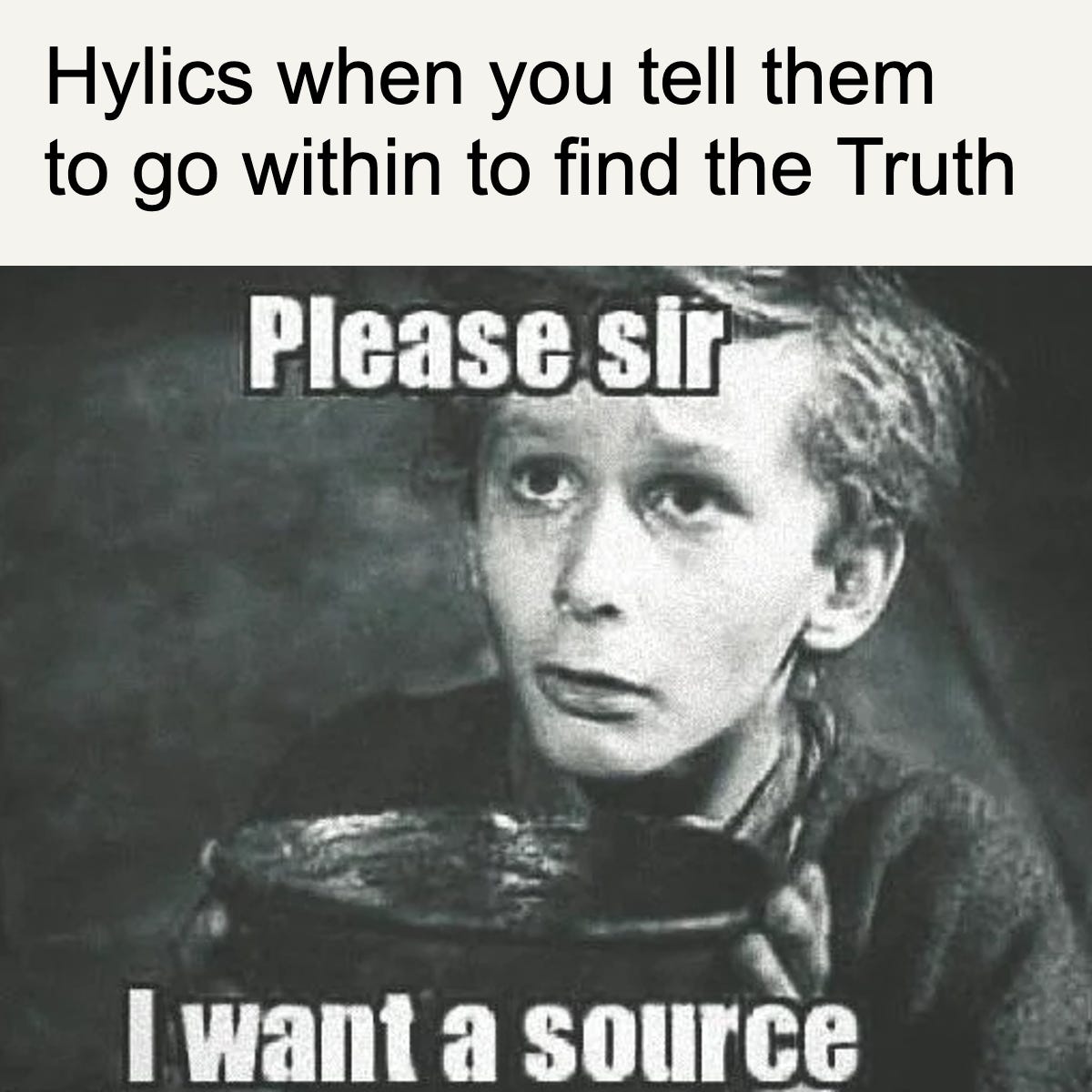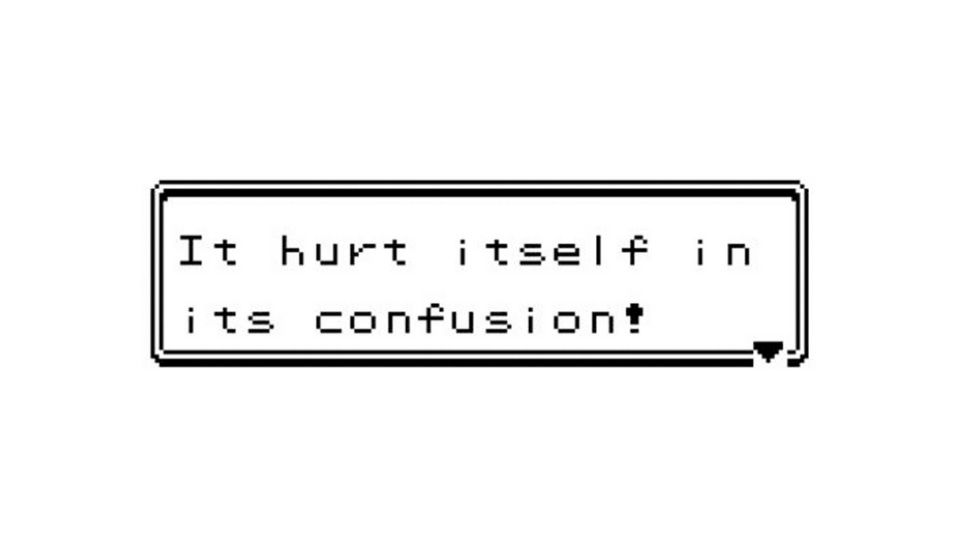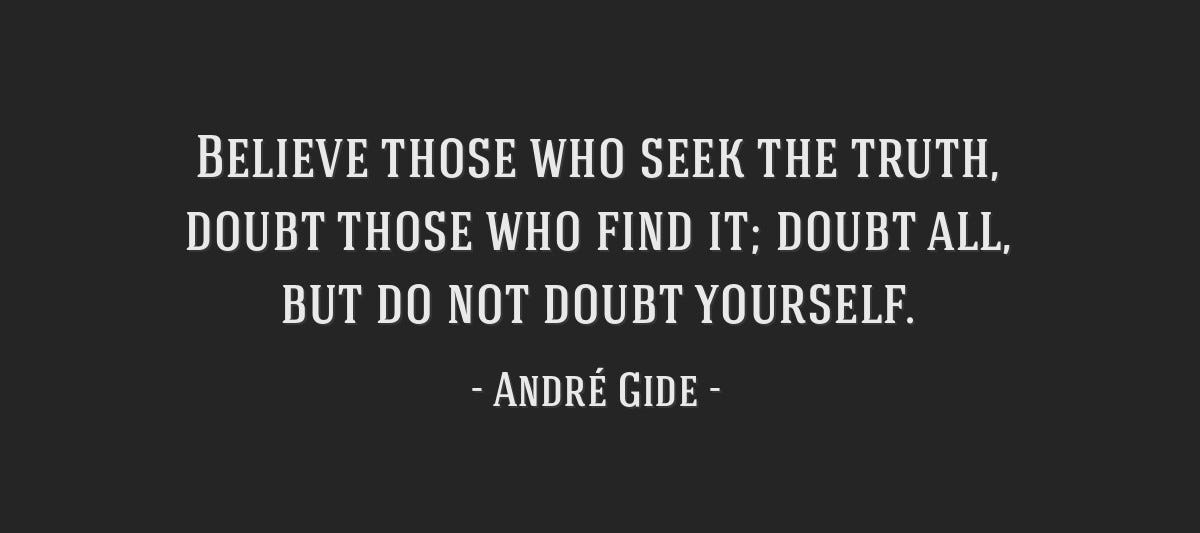Source? I made it up.
On Gnosis, or, acquiring Truth from within oneself.
In this Age of Scientism, the concept of “Gnosis” may be more difficult to grasp than ever.
Gnosis is defined as “knowledge of spiritual mysteries,” but colloquially, it refers to knowledge acquired via psychic processes like meditation, intuition, remote viewing, dreamwork, and so on.
So it can be said that Gnosis is self-acquired knowledge — derived from the True Source, which can be accessed within every individual human being…
…whereas all other “knowledge” is secondhand and, therefore, impossible to verify.
It’s easy to see why people take issue with this.
Claiming to have “Gnosis” can be abused, like anything else. For reference, just see, uh, literally every cult leader in the history of the world.
Extreme examples aside: Most people have experienced thinking that they know something “for certain,” but eventually realizing they were embarrassingly wrong.
So how can one know
that they know
what they know?
^ This exact question is often weaponized by hylics and other adherents of Scientism.
“If you are the primary source of your information,” they cry, “how can you know it’s accurate information?! How do you verify it without consulting peers, experts and authorities?! You can’t just appoint yourself an expert!!!”
But the funny thing is… “expertise” itself, is — at its core — a self-appointed status.
Think about it.
To be an “authority” on any subject, you have to be tested and trained by other “experts” (who got verified by other experts, who got verified by other experts… so who was the first expert, and who verified them? Hmm??? 🤔👀)
You may also need degrees, badges, certificates, and other gatekeep-y props to indicate that multiple people agree that you’re an expert… as if to suggest that consensus is enough to ensure legitimacy. 🙄
But break that down to its parts, and you’ll see that every expert can only be “verified” by other people who have decided that they know what constitutes an “expert.”
Thus, every credentialed, qualified, or certified “expert” is a self-appointed one, insofar as they agree to accept the judgment of their own legitimacy because other people gave them permission to.
In other words: Saying “I’m an expert because my college professors said so” is actually no less philosophically questionable than “I’m an expert because I said so.”
In either case, a value judgment is being made that designates somebody as a giver-of-permission-to-call-oneself-an-expert. Whether that “somebody” is a college professor, or yourself, raises equally pressing ethical and logical questions, such as:
Who’s to say that, if Objective Truth exists, it would be known by multiple people?
Are humans even capable of knowing Objective Truth? Shit, there are shrimp who can see more colors than we can. 🦐 What else are we not seeing?
Is there an Objective Truth at all?
What is Truth?
Plus: When you trace any professional field back to its origins — medicine, fitness, arts and sciences — you’ll see that, at the beginning, somebody had to pioneer the field. Somebody had to say “This area of knowledge is yet unknown, so I will dare to experiment and share what I find.”
They didn’t wait for someone to give them credentials before they went seeking knowledge and sharing it. And yet, ironically, without pioneers who give themselves authority to ascertain information and create a field of knowledge, there would be no resulting circlejerk of authorities-giving-each-other-the-authority-to-call-themselves-authorities in that field of knowledge.
So I’ll take this opportunity to clarify that expertise does not presume rightness, and a lack of credentials does not presume wrongness.
Meaning, when people fReAk OuT because people like myself choose to ignore “experts” and decline vaccination, they’re mistakenly assuming that I am not capable of thinking, or making decisions, because I was not granted permission to have authority over myself by the (ironically, self-appointed) authorities.
But in freaking out like this, they reveal a ghastly error in thought:
They believe Truth can only come from other people…
…and never from oneself.
Attributing knowledge to external sources serves the double-function of legitimizing oneself in the eyes of others, and absolving oneself of full, radical responsibility for one’s own ideas, words and actions.
This is not objectivity, but cowardice.
Truth is Not Subjective
To say that Gnosis is acquired from oneSelf is not to say that Truth is subjective and varies from individual to individual. Gnosis is not about “personal opinions” or “making things up.”
In fact, in my experience, Gnosis is always verified by “the external world” after I’ve acquired it from my “internal world.”
I’ll give you an example:
In my Silence post, I told the story of how, in a dream, I was given sacred teachings about the spiritual function of silence. My teacher in the dream was a blue-skinned man who relayed all his knowledge to me without speaking — he taught in silence about silence:
2 years later, I was informed by a Vedic astrologer that, per my moon nakshatra, my personal guru is Dakshinamurty, a Hindu deity who teaches in silence about silence.
Basically, it was confirmed that I met Dakshinamurty in a dream, when I didn’t even know who he was.
And my description of this being was consistent with the description given to me 2 years later by someone who didn’t know I had that dream.
Another example:
As I shared in Chaos Theory, Meet Chaos Practice, I started having visions and intuitive in-sights about Chaos Theory and, later, Chaos Magick, at age 14. Inspired by this gnosis, I decided to get a tattoo of a Chaos Star — one with the arrowheads designed in such a way that they’d “point back” to the center, signifying an “endless potential” that always returns to its source to begin again… and again… and again… ad infinitum.
Over a decade later, I learned that I am a Punarvasu Sun in Vedic astrology — and as such, my personal energetic predisposition is symbolized by Aditi’s “quiver of magical arrows.”
Per Prash Trivedi:
The arrows in the Punarvasu quiver are not normal arrows. They… magically return after fulfilling their function or mission. This conveys the idea of renewal, regeneration and endless beginnings.
Yet another thing I knew internally before learning it from external sources.
And finally — perhaps most importantly of all — when I met my spirit animal the deep sea anglerfish in a meditation 8 years ago, I was shocked that she spoke to me in a shrill female voice. Before this meditation, I had always assumed that the anglerfish with the light on its head, was male.
Even more shockingly: she was as big as me! Again, I assumed that anglerfish were maybe the size of footballs.
Years later, I learned that the one with the headlight is the female of the species — and the females can, indeed, grow to over 3 feet long.
I had never learned either of these facts, before doing the spirit animal meditation.
But I was able to accurately discern these facts in meditation — by drawing from none other than my own internal font of wisdom.
There have been many similar incidents in my life, where I just knew something without having any evidence or external sources of information.
This is what it means to be psychic.
Human Psychic Abilities
My point is that, again: contrary to what skeptics say, Gnosis actually isn’t about making things up to suit oneself. Rather, Gnosis is true, accurate, verifiable information acquired via one’s own psychic faculties.
For this reason, Gnosis and Science are not mutually exclusive!
The scientific method is merely a means of testing information, to see if it holds up after repeated experiments, peer reviews, eliminating biases, etc.
And the Gnosis a person acquires via their psychic senses can be tested just like any scientific hypothesis can!!!
This is why I made it a point to include personal anecdotes about self-acquired information that was later verified by other people who
either had no awareness of my Gnosis, or
who had no stake in the situation that could be called a bias.
Precognition, clairvoyance, intuition, remote viewing… All psychic abilities are predicated on the fact that humans are capable of acquiring information from within themselves — even when isolated, even when lied to, and even when denied access to external sources of information like books.
The Mysterious Inner World
If Truth could only come from other people outside ourselves, then logically speaking, Truth could not be said to exist at all. Everyone would be consulting others, who are also consulting others, consulting others, consulting others… in an endless game of “telephone” wrought with inherent miscommunications and misunderstandings.
But because (as evidenced by psychic phenomena like remote viewing) Truth can be ascertained alone, regardless of illusory time-space limitations, we know that Truth not only exists, but is available to everyone — regardless of culture, privilege, education level, access to resources, etc.
It’s the most logical thing I know about existence.
It’s fair.
It’s just.
We can all find Truth, because we all have the energetic gateways within ourselves that are necessary for accessing Truth.
And because psychic senses are predicated on self awareness, sovereignty, and personal responsibility, the only reason it seems incompatible with $cience is because $cience is not interested in fostering these qualities in the human population.
I said what I said.
Radical Self-Responsibility & Free Will
If anyone takes issue with what I’m saying here about accessing Truth through oneSelf —
if they think advocating for Gnosis is dangerous —
then they are very welcome to simply not listen to me.
(✧・゚: *✧・゚:* It’S sO EaSy uwu *:・゚✧*:・゚✧)
Ironically, when people reject the idea that Truth can be self-ascertained, they do so based on their own personal feelings about what’s being said.
Meaning: They reject the idea of “self-sourced knowledge” because their own self-sourced knowledge contradicts it — and in doing so, they reveal that they do, in fact, put their faith in self-sourced knowledge.
What a cosmic mindfuck, yeah?
So the only real difference I see between Gnostics and authority-followers, is that everybody’s knowledge is ultimately self-sourced and self-referential…
…but Gnostics are just willing to admit that out loud. 🙃
Gnosis is, necessarily, a direct, personal experience of Truth.
Gnosis doesn’t leave room for blaming a teacher, or guru, or expert, or deity, or cult leader, after the information later turns out to be wrong and mistakes were made.
Gnosis is saying, “Here’s what I think,” and accepting every consequence of that thought, rather than shielding oneself behind a list of authorities who “misled” and “misinformed” them.
To acquire Gnosis is to invoke one’s intrinsic freedom to think, and to choose, for oneself — rather than passing this responsibility off to someone else, in the hopes that it will save one from embarrassment, disgrace, or that dreadful, ego-crushing feeling of being wrong.
There remains one difficult aspect of Gnosis, that I feel I must acknowledge before closing.
Alone in the Universe
Truth isn’t always going to be verified — or verifiable — by multiple people.
Though Truth theoretically should stand up to testing, sometimes, no such testing is possible.
For example: You’re the only person experiencing your dreams at night. Since nobody can verify that you did experience those dreams, does that mean they didn’t happen?
Maybe.
But the question I have is: When did it begin to matter to you, whether people could validate your experiences or not?
Do you remember the moment you transitioned from being a child who lived in a land of pure imagination, shamelessly creative and expressive… to someone adult-erated, who desperately needs to be reassured that you are not actually hallucinating everything, so that others will like and accept you?
Even the belief that it matters whether your perspective is acceptable to others, is a belief you chose to invest in.
And you can choose out of it, too. (You’re free, remember?)
It may very well be the case that the ultimate Test of Truth lies not in peer reviews or consensus-seeking tests…
…but in whether one is willing to experience Truth alone,
without the comfort of a group
or an echo chamber
or a hivemind
to verify that you’re perceiving what you’re perceiving.
Call me cRaZy, but I have a sneaking suspicion that if Truth exists, it would still be Truth regardless of who perceives it, or how they perceive it.











Thank you. I had always wondered how humans as a species learned the first thing we learned, and each thing after that. It had to come from somewhere. We are quite helpless for a long time after birth, some bits of knowledge had to be built in, right?
You never fail to impress me with the originality and clarity of your writing style. I especially like how you always surprise me with your perceptive depth in a way that opens my mind to the existence of other realms. You are a gift to this world and I thank you for sharing your heart and soul.
I must also commend you for being such a powerful up stander for Margaret Anna Alice! Reading her latest post was illuminating. When she relayed what you had written in her defense, I literally got chills both physically and metaphysically! You exhibited incredible intuition and integrity of character. Wow! To know someone such as you exists in this world confirms to me that truth, honor, love, and spirituality is supreme and will never be extinguished.